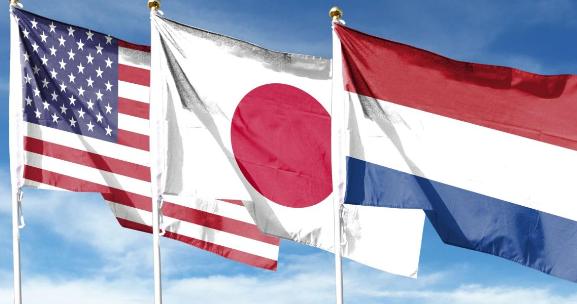
Recently, the international stage has once again stirred up waves, and the United States seems to be once again trying to coerce Japan and the Netherlands through various means to "decouple" and draw a clear line with its important partners. However, it is puzzling that in the face of the outside world's doubts and accusations, the United States has flatly denied, insisting that it has never had such an intention. So, what is the truth behind this? Why does the US refuse to admit what it has done?
In recent years, the United States has frequently intervened in the global economic pattern, trying to maintain its hegemonic status through the "decoupling" strategy. From trade wars to technological blockades, from diplomatic isolation to economic sanctions, the United States has constantly wielded a big stick in an attempt to draw recalcitrant countries into its fold. This time, Japan and the Netherlands have become the new targets of the United States' decoupling.
According to reports, through a series of political and economic means, the United States is trying to force Japan and the Netherlands to abandon normal economic and trade exchanges with China and instead establish a closer cooperative relationship with the United States. However, this approach has been strongly opposed by Japan and the Netherlands. They believe that economic and trade cooperation with China is vital to their economic development and cannot be easily given up because of pressure from the United States.
In the face of external doubts and accusations, the United States has been unusually calm. They insist that they have never had the intention of coercing Japan and the Netherlands to "decouple", and that everything is misunderstanding and speculation from the outside world. However, this argument clearly does not hold water.
First of all, from the various actions of the United States, it is clear that they are trying to force Japan and the Netherlands to change their positions through political and economic means. Whether it is strengthening economic cooperation with the United States or restricting economic and trade contacts with China, it shows the intention of the United States.
Second, the inconsistency between America's words and deeds casts doubt on its credibility. On the one hand, they keep talking about maintaining global economic stability and cooperative development. On the other hand, it seeks to undermine this stability and cooperation through a strategy of "decoupling." This contradictory approach raises the question of whether the US is defending global interests or pursuing its own hegemonic position.
In fact, the "decoupling" strategy of the United States will not only fail to achieve the desired effect, but will bring greater risks and challenges to the global economy.
First, the strategy of "decoupling" will undermine the stability of global industrial and supply chains. In today's highly integrated global economy, the economic links between countries are increasingly close. If the United States forces other countries to "decouple" from itself, it will lead to the rupture of the global industrial chain and supply chain, and then trigger a global economic crisis.
Second, the strategy of "decoupling" will reduce the growth momentum of the global economy. At a time when the global economy is facing many challenges, countries need to strengthen cooperation and jointly address them. However, the "decoupling" strategy of the United States will weaken this impetus for cooperation, leading to a slowdown or even stagnation of global economic growth.
Finally, a "decoupling" strategy would also undermine America's own interests. As a country highly dependent on international trade and investment, the United States will lose its own economic interests if it forcibly asks other countries to "decouple" from it. At the same time, it will make other countries distrust the United States, which in turn will weaken the influence of the United States in the global economy.
In general, it is clearly undesirable for the United States to once again threaten Japan and the Netherlands to "decouple". This approach will not only fail to achieve the desired results, but will bring greater risks and challenges to the global economy. At the same time, America's refusal to admit what it has done raises questions about its credibility. As a responsible power, the United States should abandon the strategy of "decoupling" and strengthen international cooperation to jointly address global challenges. Only in this way can we promote the sustained and steady development of the global economy.

報告顯示,中國電力投資加速增長,預計2024年電網基建投資將超過5300億元。
近日,市場迎來了一則引人注目的消息:工業巨頭3M公司(MMM.N)在本周五公布了其季度業績報告,隨後股價飆升至近兩年來的
最近,外媒給OpenAI算了筆賬,今年可能要血虧50億美元。
近日,巴黎奧運會和世界鐵人三項協會聯合發布了一項重大決定,宣布因塞納河水質污染問題,原定於近期進行的奧運會鐵人三項首次下
當地時間7月18日,法國巴黎發生了一起令人震驚的持刀襲警事件。
近期,一則重大消息在國際舞臺上引起軒然大波,馬來西亞宣布加入金磚國家。
調查發現,互聯網和智能手機的使用幹擾了韓國近五分之一學生的生活。